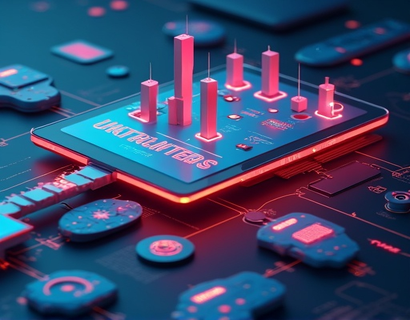Revolutionizing App Ecosystems: The Synergy of Crypto and AI
The integration of cryptocurrency and artificial intelligence is ushering in a new era of digital transformation, fundamentally altering the landscape of app ecosystems. This convergence is not just a technological curiosity but a powerful force driving innovation and enhancing user experiences. As tech-savvy innovators and early adopters, understanding the dynamics of this synergy is crucial for staying ahead in the rapidly evolving digital world.
The intersection of cryptocurrency and AI is creating advanced digital solutions that offer unprecedented levels of security, efficiency, and personalization. Cryptocurrency provides a decentralized and transparent means of transaction, while AI brings intelligent automation and data-driven insights. Together, they are redefining how applications are developed, deployed, and interact with users.
Enhanced Security Through Cryptographic Techniques
One of the most significant benefits of integrating cryptocurrency into app ecosystems is the enhancement of security protocols. Cryptographic techniques such as blockchain technology ensure that data transactions are immutable and tamper-proof. This level of security is particularly vital for applications handling sensitive information, such as financial services, healthcare, and personal identification.
Blockchain's decentralized nature eliminates the need for intermediaries, reducing the risk of single points of failure and cyber attacks. Smart contracts, self-executing contracts with the terms directly written into code, further automate and secure transactions. These features make applications built on blockchain more reliable and trustworthy, fostering greater user confidence and adoption.
AI-Driven Personalization and User Experience
Artificial intelligence plays a pivotal role in personalizing user experiences within app ecosystems. AI algorithms analyze vast amounts of user data to identify patterns and preferences, enabling applications to tailor content, recommendations, and interactions to individual users. This level of personalization not only enhances user satisfaction but also increases engagement and retention rates.
For instance, AI-powered chatbots and virtual assistants can provide real-time support and guidance, addressing user queries and concerns with human-like interactions. These AI-driven tools can operate 24/7, ensuring consistent and high-quality service without the limitations of human availability. Moreover, AI can predict user behavior and proactively suggest actions or content, creating a seamless and intuitive user experience.
Optimized Performance and Efficiency
The combination of cryptocurrency and AI also leads to optimized performance and efficiency in app ecosystems. AI algorithms can dynamically adjust resource allocation based on real-time demand, ensuring that applications run smoothly and efficiently. This adaptive approach minimizes latency and maximizes throughput, providing users with a faster and more responsive experience.
Additionally, blockchain's energy-efficient consensus mechanisms, such as Proof of Stake, reduce the computational power required for transaction validation. This not only lowers operational costs but also minimizes the environmental impact of app ecosystems. As sustainability becomes a key consideration for businesses and consumers alike, this aspect of blockchain technology aligns well with broader environmental goals.
Decentralized Applications and Ecosystem Interoperability
Decentralized applications (dApps) are at the forefront of the crypto-AI synergy, offering new paradigms for app development and deployment. dApps leverage blockchain's decentralized architecture to create applications that are transparent, secure, and resistant to censorship. AI enhances these dApps by providing intelligent functionalities and data-driven insights, creating a synergistic effect that amplifies their capabilities.
Interoperability between different blockchain platforms and traditional app ecosystems is another critical area of innovation. Cross-chain technologies and AI-mediated data translation protocols enable seamless communication and data exchange between disparate systems. This interoperability fosters a more connected and cohesive digital environment, where users can access a wide range of services and applications without barriers.
Innovative Business Models and Revenue Streams
The convergence of cryptocurrency and AI is giving rise to novel business models and revenue streams for app developers and service providers. Tokenization, the process of representing assets on a blockchain, allows for the creation of digital tokens that can represent various forms of value, from equity to utility. These tokens can be used to incentivize user participation, reward contributors, and facilitate microtransactions within applications.
AI-driven analytics provide deep insights into user behavior and market trends, enabling more informed decision-making and strategic planning. By leveraging these insights, businesses can identify new opportunities, optimize operations, and create value-driven offerings. The data transparency and immutability provided by blockchain further enhance trust and credibility, attracting more users and partners to these innovative ecosystems.
Challenges and Considerations
Despite the numerous benefits, the integration of cryptocurrency and AI in app ecosystems is not without challenges. Regulatory uncertainties and compliance issues remain significant hurdles, as governments and regulatory bodies grapple with the implications of decentralized technologies. Ensuring user privacy and data protection is also paramount, as the vast amounts of data processed by AI systems must be handled responsibly and ethically.
Technical complexity is another factor to consider. Developing and maintaining blockchain-based applications requires specialized skills and knowledge, which can be a barrier for some developers. However, as the ecosystem matures, tools and frameworks are becoming more accessible, reducing the entry barriers for tech professionals.
Future Prospects and Emerging Trends
The future of app ecosystems is increasingly intertwined with advancements in cryptocurrency and AI. Emerging trends such as quantum computing, edge AI, and the Internet of Things (IoT) are set to further transform this landscape. Quantum computing has the potential to revolutionize AI algorithms, enabling more complex and efficient computations. Edge AI brings intelligent processing closer to the data source, reducing latency and enhancing real-time capabilities.
The rise of decentralized finance (DeFi) and non-fungible tokens (NFTs) within app ecosystems is also worth noting. DeFi platforms leverage blockchain and AI to create financial services that are open, transparent, and accessible. NFTs, on the other hand, represent unique digital assets, opening new avenues for creativity and ownership in digital spaces.
As these technologies continue to evolve, the potential for innovation and disruption in app ecosystems grows exponentially. Tech professionals and early adopters who embrace this synergy will be well-positioned to lead the charge in shaping the future of digital experiences.










































